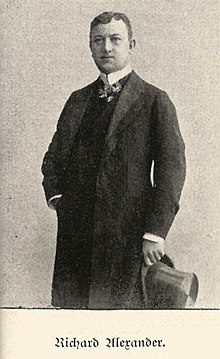Richard Alexander (actor, 1852)
Richard Alexander (born November 2, 1852 in Berlin ; † May 24, 1923 ) was a German theater and silent film actor as well as a comedian and artistic director .
Life
He was first a merchant and belonged to this class for four years. During this time he was already spending his leisure hours learning Schiller's hero roles by heart and trying his hand at a stage for lovers with success. He finally left the office entirely, took dramatic lessons from the then head director at the Viktoriatheater Wilhelm Hock and took the stage on April 23, 1873 at the Residenztheater in Berlin as Samaja in Hebbel's Judith . Then he went to Potsdam as a youthful hero and lover (“Mortimer”, “Ferdinand”, “Carlos”), but soon felt that the subject of conversational roles appealed to him more than the subject of worn classics. In 1874/75 he worked at the City Theater in Hamburg, 1875/76 at the City Theater in Stettin, 1876/79 at the City Theater in Nuremberg, where he caught the attention of Possart , who hired him to Munich, where he stayed until 1860. The director Karl von Bukowics liked Alexander in the role of “Lothair” in “Librarian” so much that the latter presented him with a contract for the Vienna City Theater immediately after the performance. Alexander signed and worked there from 1880 to 1881. Emil Thomas signed Alexander to the Wallnertheater in 1883. On September 1, 1891, he moved to the Residenztheater, where he also worked as a deputy director from that time.
At a hunting party of Emperor Wilhelm II, the latter was so amused by Alexander that he offered him a job at the Royal Theater. Alexander did not accept the offer and became director of the Residenztheater in 1904.
During the 33rd repetition of the swan “The Wedding Night”, an actor missed his role and Alexander got a “nervous shock”. Thereupon he was ordered to stay at a spa.
During his trip there, he learned by telegram that “the rumor had spread in Berlin that I had gone mad and plunged into the sea”. The man believed dead immediately telegraphed back: “I am about to go to Heligoland to breathe some sea air, I just found out about my death today. Since I prefer to be buried in Berlin, I will transfer myself there and invite all those who suffer to appear in the Residenztheater on Thursday evening, where the funeral will take place in a solemn manner. "
In 1912 he handed over the management of the theater to Ferry Sikla . Before his death in 1923, he made a few silent film appearances.
Contemporary reception
“... Alexander moves with a mood that one never gets tired of, a lightness that runs through all imaginable moods without any constraints, and a natural comedy of movements and facial expressions that are hard to match. The best proof of his artistry is to be found in the fact that he does not lose any of his freshness even when he appears in the same role every day, sometimes for a whole season and sometimes even longer ... "
“His jokes didn't stick, nothing was served with sweaty hands, everything remained nice and amusing, and you didn't need to be ashamed of having laughed with others. He was funny: his long legs twitched with amusement, his nose was full of good humor, his larynx chuckled with humor. He made hundreds of thousands happy. "
Filmography
- 1919: The robbery of the Sabine women
- 1921: Free path for the able
- 1922: It stays in the family
literature
- Ludwig Eisenberg : Large biographical lexicon of the German stage in the 19th century . List, Leipzig 1903, p. 21 f.
- Eugen Zabel : contemporary stage artist. Biographies and characteristics. In: Spemann's golden book of the theater. Stuttgart 1912. Richard Alexander pp. 565-567.
Web links
- Richard Alexander at filmportal.de
- Richard Alexander Thoughts on His Death by Kurt Tucholsky
- Richard Alexander "Rampensau bei Wilhelm Zwo", article in Der Tagesspiegel from April 18, 2014
Individual evidence
- ↑ Richard Alexander Thoughts on his Death by Kurt Tucholsky
| personal data | |
|---|---|
| SURNAME | Alexander, Richard |
| BRIEF DESCRIPTION | German theater and silent film actor as well as comedian and theater director |
| DATE OF BIRTH | November 2, 1852 |
| PLACE OF BIRTH | Berlin |
| DATE OF DEATH | May 24, 1923 |

